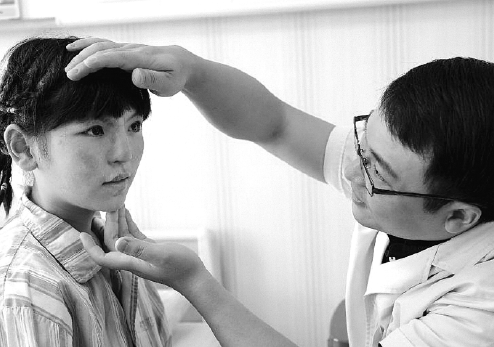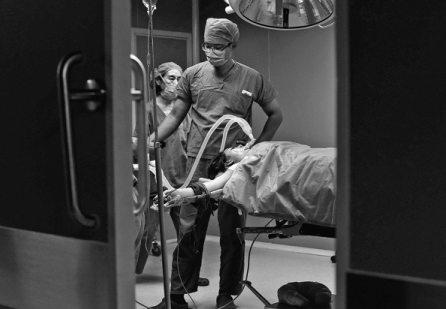Private sector offers doctors flexibility
Ongoing reforms remove restrictions on working independently, encourage surgeons to operate at multiple sites

Plastic surgeon Guo Shuzhong decided to resign from First Affiliated Hospital of Xi'an Jiaotong University in mid-2017 to establish a private plastic surgery hospital with a group of renowned doctors and investors.
Guo, now 56, conducted China's first and the world's second face transplant operation in 2006 at Xijing Hospital, a military hospital in Xi'an, capital of Shaanxi province, where he worked for 33 years until late 2015, before joining the university hospital in early 2016.
He achieved international recognition again in late 2016 when he and his team grew a human ear on a man's arm after his ear was deformed in a car accident.
Now, as president and equity holder of First BCC Plastic Surgery Hospital in Beijing, Guo said he is satisfied with the current situation and looks forward to new possibilities, despite not being able to continue with basic scientific research.
"I earn much more money than I used to, but what's more valuable to me is the freedom to focus on ear surgeries and the agreeable work environment where both patients and doctors feel respected," he said.
His dream is to build a world-class ear reconstruction surgery center in China in terms of both surgery quality and quantity, and feels the private hospital is the right place to realize it.
In public hospitals, much of his energy was diverted to other plastic surgery fields he had little interest in, administrative affairs and training of young doctors.
Now he can spend more time on communicating with patients, has more outpatient visits for ear reconstruction, and performs more ear surgeries.
Guo is among a growing number of aesthetic medicine professionals venturing into the private sector in pursuit of higher pay and career advancement.
Despite a lack of reliable data on China's aesthetic medicine professionals practicing in private facilities, China's leading online platform for aesthetic medicine, the Nasdaq-listed So-Young International Inc, reported impressive growth in the third quarter of 2019, with most registered practitioners coming from the private sector.
So-Young's total revenue in the third quarter of 2019 reached 302.4 million yuan ($43.35 million), a 79.6-percent increase year-on-year, while profit from operations was 20 million yuan compared with a loss of 22.1 million yuan in the same period of 2018.
Du Taichao, an eminent plastic surgeon with Beijing Huangsi Aesthetical Surgery Hospital, attributes the surging number of aesthetic medicine practitioners in the private sector to China's ongoing medical reforms that optimize distribution of resources under market mechanism, particularly to the policies that remove restrictions on independent practice and encourage licensed doctors to practice at multiple sites.
Internet applications, especially social media and specialist platforms for aesthetic medicine, also make it easier for doctors to promote themselves, he said.
Gengmei, a Chinese online aesthetic medicine platform, said about 20,000 doctors and 8,000 facilities have registered on it, among which 90 percent are from the private sector.
So-Young provides a variety of tools for doctors to create and promote online content as well as channels for doctor-patient communication, including online consultancy, video sharing and livestreaming, to help doctors and facilities gain professional reputations and provide services.
In 2019, the gross merchandise volume of 423 doctors on the platform surpassed 1 million yuan, increasing 70 percent from 2018.Their average income through the platform was 2.03 million yuan, with average customer expenditure increasing 31.53 percent, figures from the company showed.
Plastic surgeon Jiang Ya'nan left a public hospital to work for a private facility in 2014, and opened her own practice in 2016.
Last year, she answered online inquiries from more than 10,000 patients on So-Young, which helped her attract attention from potential customers, and made the platform the largest online channel for her clinic to get customers.
Guo observed that the internet is becoming a vital channel for China's private aesthetic medicine practitioners to get in touch with targeted customers, build their reputations, and create close doctor-patient bonds to enhance services and boost revenues.
His hospital, which was officially established in September 2017, is already making a profit and is gaining a good reputation among customers and the medical community.
The hospital's rapid rise is mainly because it is managed by professional doctors who have equity shares and pay extreme attention to fair pricing, patient experiences and avoidance of overtreatment, but the influence of the internet is also indispensable.
Social media and video-sharing platforms enable the hospital and its doctors to communicate with patients directly, respond to their inquiries quickly, and post problem-solving articles, tutorials or videos that patients are interested in, to foster trust and establish a professional and caring image, he said.
Yang Mingjie, an experienced plastic surgeon from Dalian, Liaoning province, who established her own practice Dalian Calmagic Cosmetic Clinic in 2015, agreed that easy access to internet platforms for both doctors and patients, including social media, video-sharing apps, and So-Young, provide doctors more cost-effective channels to demonstrate to potential customers their medical and aesthetic expertise-the core of their professional skills.
Her team regularly spends time on So-Young, Sina Weibo, and WeChat to promote professional knowledge and enhance doctor-patient communication.
In 2018, her clinic's monthly revenue hit more than 1 million yuan, although it declined in 2019 due to overall economic slowdown.
The brand promotion of an aesthetic medicine practitioner should center on pre-and post-surgery demonstration and the doctor's personal philosophy of aesthetics, with complementary information on their educational experiences and career achievements, so that messages delivered to patients will not be misunderstood and the communication between doctor and patients will be productive, according to Yang.
"While conducting an aesthetic medical procedure is relatively less demanding on the number of doctors and nurses, or the operation of complicated medical devices, compared with heart, brain or other major medical surgeries, it requires more high-quality doctor-patient communication and mutual understanding to avoid medical disputes because the appreciation of aesthetics is quite subjective," she said.
However, both Guo and Yang noted that market competition has become fiercer amid the surging number of aesthetic medicine practitioners in the private sector.
Guo advised that doctors, especially those who leave public hospitals for private ones, strengthen their medical and self-promotion skills.
He also said integrity is a must if a doctor wants to stand out from the competition.


Today's Top News
- Sanya rises as magnet for Russian tourists
- China's steady opening-up for Asia-Pacific economic growth
- Blueprint seen as a boon for entire world
- 'Kill line' an inevitable outcome of US system
- Fusion energy drive entering a decisive phase
- Trump threatens 10% tariffs on 8 NATO allies






























